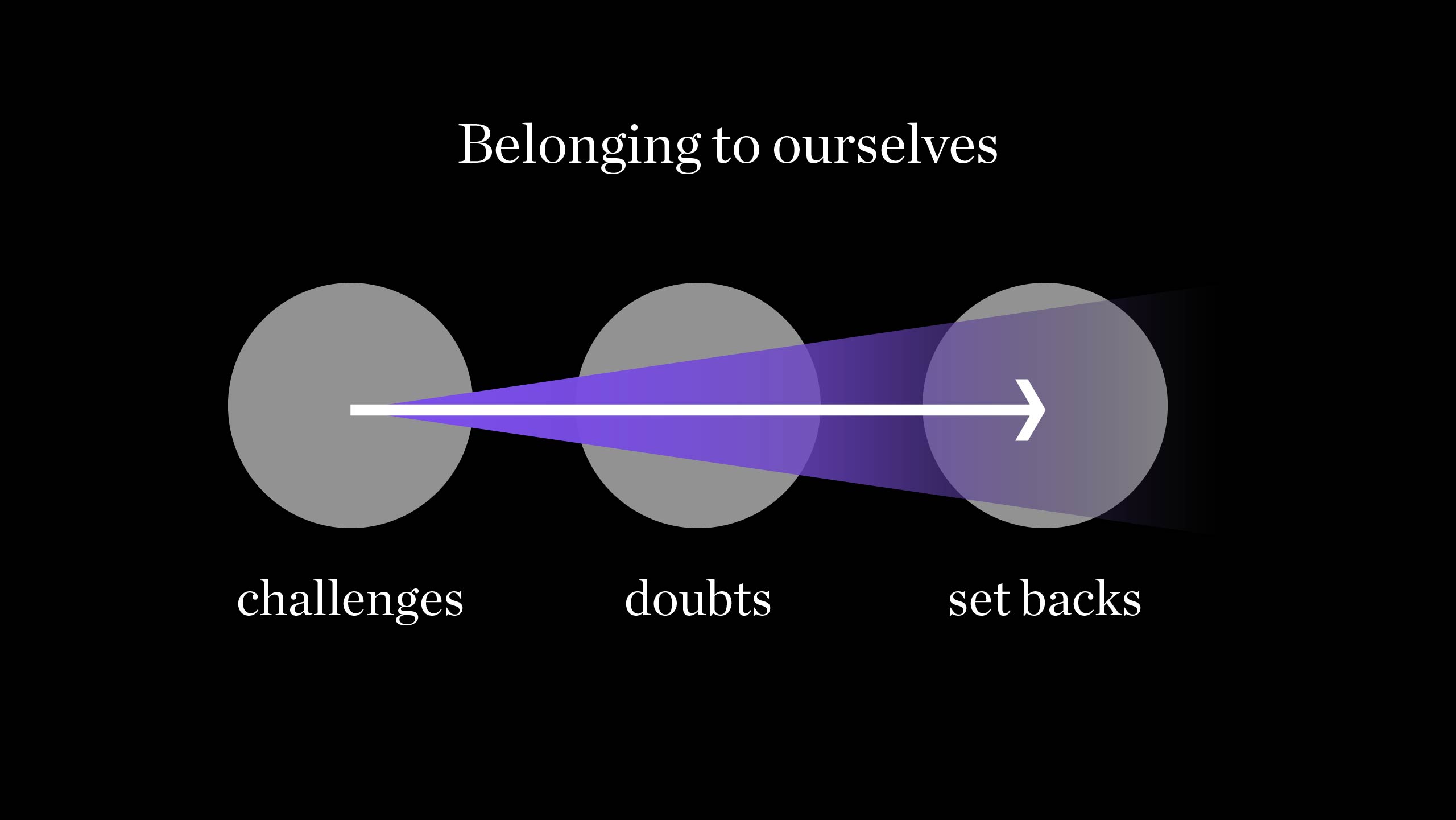Article last updated on January 27, 2023
Belonging to yourself means embracing your inner strength, valuing your unique identity, and living with intention and purpose each day.
It’s about understanding who you are and taking ownership of your personal power so that you can create the life that you desire for yourself without relying on anyone else for happiness or validation.
For many of us, however, learning how to belong to ourselves is a journey filled with challenges, doubts, and set backs along the way.
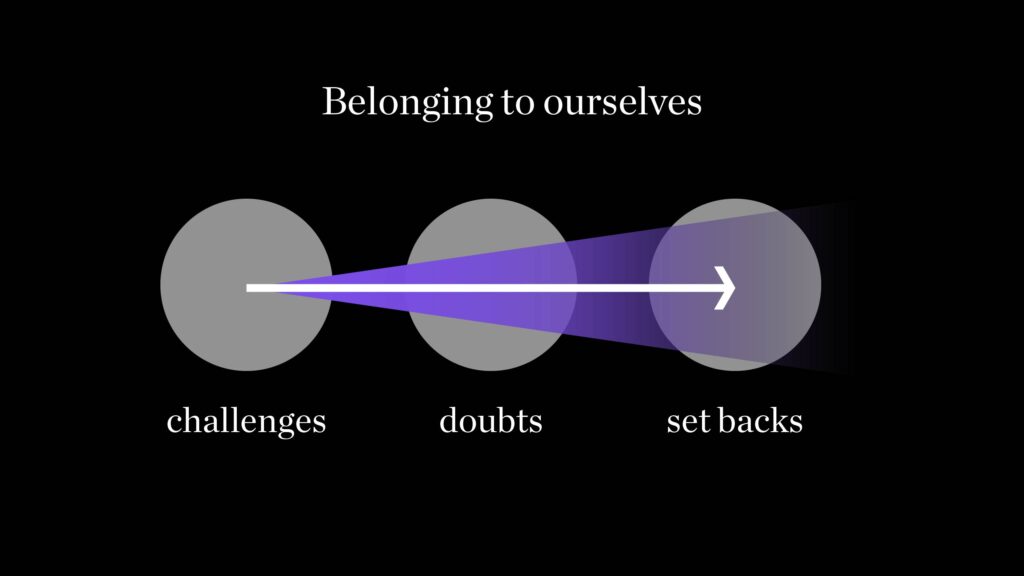
But it doesn’t have to be this way – with the right guidance, we can start making positive changes in our lives today that will empower us to reach our full potential while still living authentically as ourselves!
When we live authentically, our true selves shine through in everything we do, from the way we interact with others to how we approach difficult situations.
Living this way helps us feel connected, accepted, and confident in ourselves. And when we feel like we belong in our own skin, life becomes easier and more rewarding.
But how do you learn to truly belong to yourself?
In this article, I will explore what belonging looks like on a personal level, how it can help us lead more meaningful lives, and practical tips for making it happen.
My goal is to offer insight into why self-belonging matters so much — both for ourselves as individuals and for those around us who benefit from our authentic presence.
So if you’re looking for ways to tap into your inner strength and cultivate an unshakeable sense of belonging within yourself, then let’s get started!
Identifying Your Core Values
When we are able to live authentically, we can truly become ourselves and find a sense of belonging.
To do this, understanding our core values is essential for personal growth. It helps us discover the aspects of life that are most meaningful to us and leads us on an archetypal experience towards true connection.
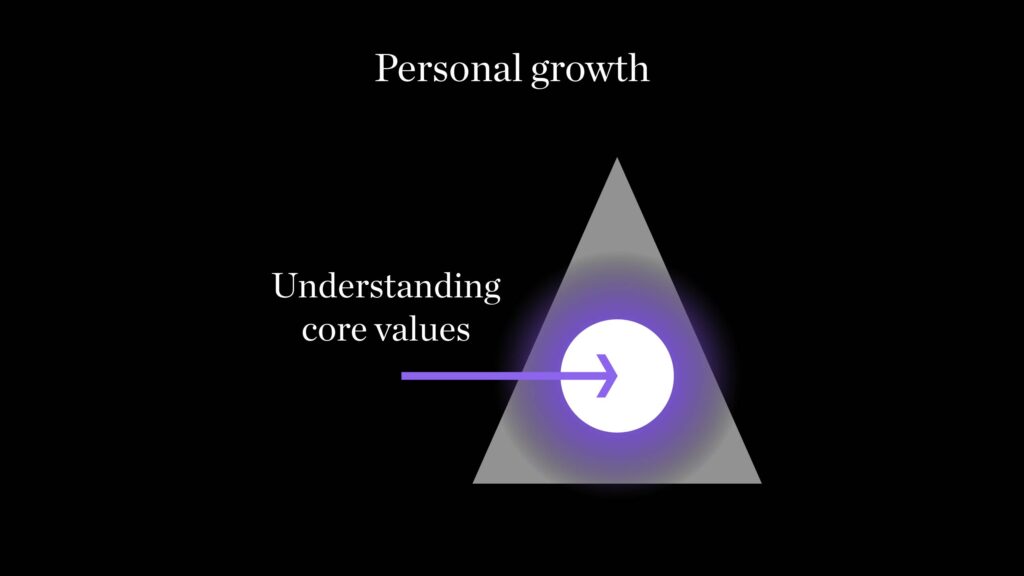
A great way to start your journey into self-discovery is by reflecting on what makes you unique and how it contributes to who you are as a person.
Ask yourself questions such as:
- What activities bring me joy?
- What qualities make me special?
- How do I want my life to look in 5 years time?
Taking the time to get clear on these answers will provide valuable insight into living more authentically.
Once you have identified your core values, give yourself permission to act accordingly and make choices that align with them.
When faced with decisions or challenges, use your internal compass of morality and integrity as guidance – it is usually right!
Additionally, seek advice from trusted friends or mentors when needed, but ultimately trust in yourself above all else – even if it means deviating from societal norms or expectations at times.
Understanding Your Life Purpose

Understanding your life purpose is key to living authentically. It’s the foundation for setting meaningful goals and creating a life of fulfillment and joy.
To gain clarity about what truly matters, it helps to think deeply about how you want to contribute to the world around you. I’m reminded of my own journey.
I initially occupied myself with mundane tasks, but I soon realized that this was not where true growth opportunities lay.
Instead, they come from real connection: connecting with other people through shared values, offering advice (with permission) on their goals or struggles, and focusing on what positive change we all want to see in the world.
If you’re feeling overwhelmed by trying to figure out your life purpose, one helpful tip is to remember that everyone has something unique they can offer the world, whether it be a skill set or simply being who they are!
Taking time out of your busy schedule to reflect on these things will help reveal ideas for how you can find more meaning and satisfaction in your work.
Reflection also allows us to develop our personal core values, which then define how we live our lives honestly and authentically.
So take some time each day for yourself – even if it’s just five minutes – so that you can begin uncovering those answers within yourself.
Concentrate on the positive change you wish to see in the world

Being true to yourself is essential for living an authentic life. It’s no longer enough to just go through the motions and follow old patterns; we must take action that aligns with our own core values.
To do this, it’s important to focus on the positive change you want to see in the world.
This doesn’t mean that you have to become a martyr or throw yourself into the service of others without understanding your own needs first. In fact, paying attention to your personal life goals and taking care of healthy relationships can help create an active mind and a focused mindset when approaching self-improvement.
Here are five tips that can help:
- Accept advice only with permission – don’t be afraid to set boundaries with people who may not understand where you’re coming from.
- Find time for reflection – make sure you allow space for silence and contemplation each day so that you can reconnect with yourself.
- Foster meaningful connections – prioritize building strong relationships based on mutual respect rather than superficiality.
- Speak up about injustice – use your voice as a tool for justice and stand up against all forms of prejudice whenever possible.
- Honor your birth mother– remember the importance she played in bringing you into the world by being grateful for her sacrifices.
By focusing on these elements, we can start paving our way towards greater self-awareness and living authentically according to our own truth.
This means recognizing how we can best contribute positively to the world while still honoring our individual needs. From there, improvement becomes easier because we trust ourselves more deeply.
Improve self-awareness
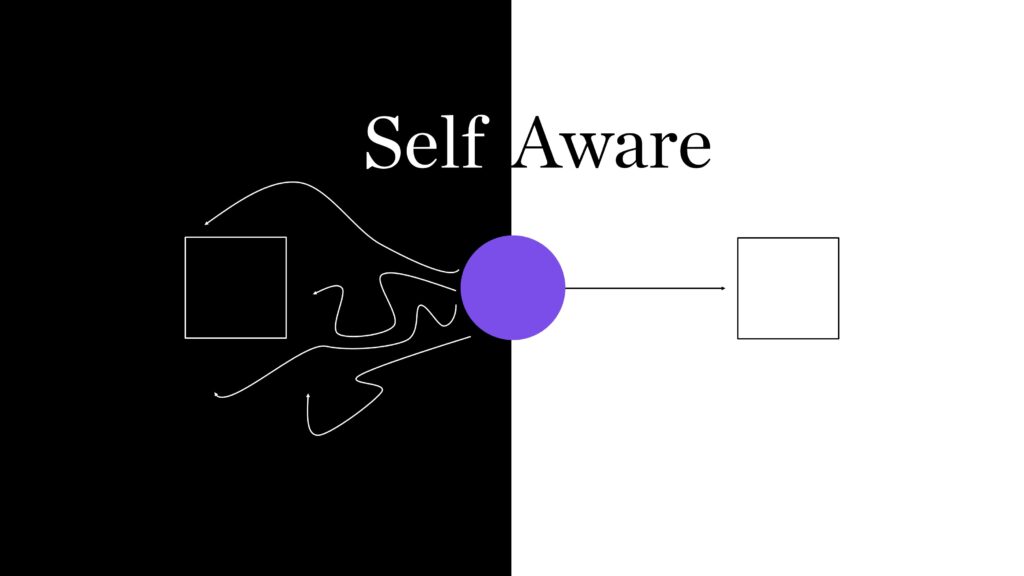
Belonging to yourself is a courageous act; it’s scary but necessary for us to live authentically.
Self-awareness is the essential starting point of this journey: understanding our innermost thoughts and feelings, recognizing how we react in certain situations, and being honest about what we want and need.
This process can be difficult since hollow substitutes like alcohol or romantic relationships are often used to mask our true emotions.
Looking back on my childhood and adolescent years, I realize that self-awareness was never something I paid attention to as much as I should have. It became clear that if I wanted any chance at living an authentic life, then improving self-awareness needed to become a priority above all else.
Practice self-love and unconditional giving
All of us have heard the phrase “love yourself” at some point in our lives. Unfortunately, it is often easier said than done.
However, this piece of advice is actually quite important to living an authentic life, and that’s why I’d like to talk about self-love and unconditional giving today – two fundamental aspects of life that can help you dive into a journey full of honesty and courage.
Self-love is not just about treating ourselves with kindness or taking care of our physical needs; it also involves understanding our unique values and personality traits.
It means having compassion for oneself even on days when we mess up or make mistakes.

When we start loving ourselves unconditionally, we no longer feel the need to compare ourselves to others because true confidence comes from within.
This doesn’t mean there won’t be moments where you doubt your worth, but knowing how to cope with such feelings constructively helps improve overall wellbeing.
Unconditional giving may sound selfish, as most people associate charity solely with helping others without expecting anything in return – which is indeed true!
But what if I told you that practicing random acts of kindness towards yourself could be equally rewarding?
Noticing small everyday victories, feeling grateful for all the good things around you, and being kinder to those closest to you are basic connections between self-love and service to others.
At times, the best way to show gratitude for what we have experienced is by sharing it with someone else, so don’t hesitate to reach out when needed – it will only add more meaning to your life!
So, take a moment and appreciate all that makes you special – every one has something valuable inside them waiting to be discovered.
Yes, it takes effort and patience, but investing time in yourself now will eventually lead you closer to acceptance and authenticity down the line.
Accepting Your Strengths and Weaknesses
Accepting our strengths and weaknesses is like riding a rollercoaster. It can be thrilling at times, but also intimidating when we face the unknowns.
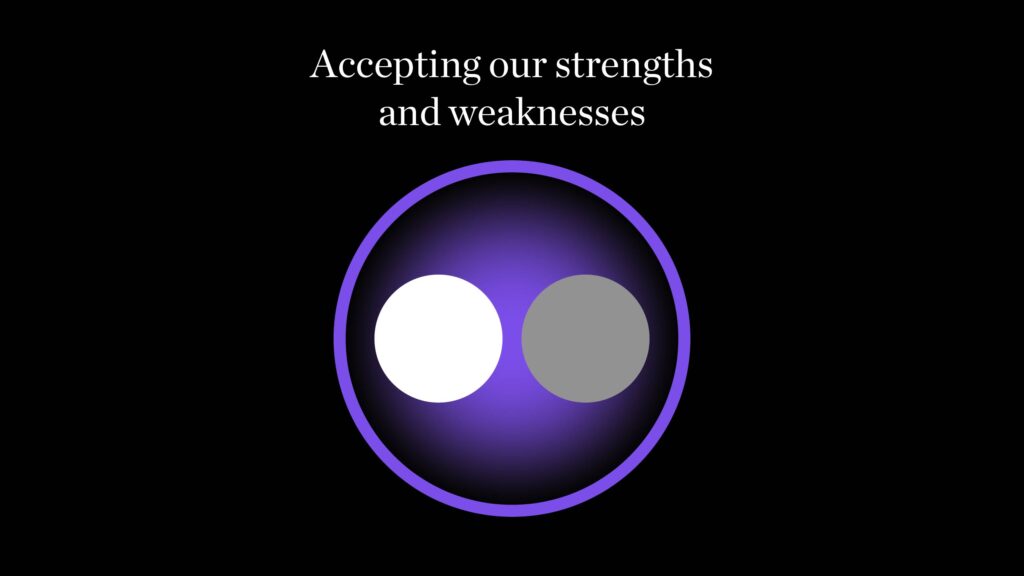
The archetypal process of belonging to ourselves involves allowing ourselves to truly accept all parts of who we are – both our flaws and gifts.
This acceptance brings us closer to becoming our authentic selves by understanding that it’s not only okay to have both strengths and weaknesses, but necessary for growth.
The act of accepting ourselves allows us to become more open-minded about what life has in store for us and how we choose to live authentically with those around us.
To get to this level of self-acceptance, you have to make a commitment from the inside. This opens the door to love, trust, joy, resilience, and courage, which will lead to fulfillment through emotional connections with other people.
We must recognize that having imperfections or making mistakes does not make us any less valuable as individuals or members of society.
Instead, they help shape the person we want to become and provide invaluable lessons along the way.
By embracing these moments as learning experiences instead of focusing solely on our perceived shortcomings, we take comfort in knowing that no matter what happens, we belong to ourselves first – giving us permission to explore new possibilities without fear of judgement or failure.
Being honest with yourself

Honesty is hard, but it’s essential to living authentically. The ability to be honest with ourselves – especially when the truth stirs up painful memories or uncomfortable emotions – takes courage and compassion.
At our core, we all want connection: authentic relationships that give us joy and give meaning to our lives.
Yet many times we hold back from sharing who we truly are because we fear judgment or rejection. In order to connect deeply with others on an emotional level and live an authentic life, being honest with ourselves is key.
By allowing ourselves to open up about our true feelings, experiences, and beliefs without fear of judgment, we create space for deep connections, which can lead to greater self-awareness and self-acceptance.
We learn more about what matters most to us in life as well as how best to honor those values through meaningful action.
This helps us move forward towards leading a more fulfilling and purposeful existence.
When we take time for introspection, ask tough questions, and practice complete honesty within ourselves – even if the answers make us feel vulnerable or exposed – then we gain inner strength that allows us to fully express who we are in each moment without hesitation or apology.
And this leads to a much deeper sense of belonging not only with other people but also with oneself than was previously possible.
Letting go of unhelpful habits

Letting go of unhelpful habits can be like cutting away dead wood from a tree. It’s an essential act of pruning that helps us grow and flourish in our lives, but it isn’t always easy! We often have to let go of the things we’ve become attached to; those familiar patterns of behavior that no longer serve us.
Letting go means accepting uncertainty and change, which can cause fear and anxiety.
But what if you allowed yourself to take one small step towards shedding these behaviors?
What would that look like for you?
The first thing I suggest is self-reflection: think about your current habits and ask yourself honestly whether they are helping or hindering your growth as a person.
Once you get clear on that, then start asking yourself how you could make some positive changes in order to move forward in a more authentic direction.
This might include setting boundaries around certain activities or people, taking regular breaks throughout the day, or simply getting out of your own headspace and connecting with nature every now and then.
Allowing ourselves to experience new ways of being can open us up to greater possibilities than we ever thought possible before!
By committing to making small changes each day – however big or small – we gradually create space for true authenticity in our lives.
Through this thoughtful practice of releasing unhelpful habits, we begin creating healthier personal relationships with ourselves and others along the way.
Forgive yourself and others

It’s hard to let go of unhelpful habits and forgive oneself, but it is a necessary part of living authentically. We must learn how to be kinder to ourselves, especially when we make mistakes.
I like the metaphor of forgiving yourself being like taking off an old pair of shoes; you might feel uncomfortable at first because they don’t fit well anymore, but eventually you will get used to them!
One way that I have found helpful in learning how to forgive myself is by understanding why my behavior was what it was before judging or blaming myself for it.
This helps me understand where the behavior came from and why I acted out in such a manner.
Reframing mistakes as lessons rather than failures has been instrumental in helping me practice self-forgiveness as well. It’s also important not just to forgive yourself but others too – even if they do not deserve it.
By doing so, you are letting go of any negative energy surrounding that person and allowing yourself to move on without resentment weighing you down.
The journey towards true authenticity requires us to take our own path, one that may require some difficult introspection, healing work, and forgiveness along the way.
Only once we have done this can we truly know who we really are and live with integrity according to our values and beliefs.
So take those shoes off, give yourself (and maybe someone else) a hug, and start walking your authentic path today!
Following Your Own Path
When it comes to living authentically, sometimes the hardest thing is to follow your own path.

This means being brave enough to stand up for who you are and what you believe in—even if that might not be popular with those around you.
It’s about having the courage to act on that inner voice telling you which direction to go, even when society or other people may discourage you from doing so.
The truth is, we all have an internal compass that guides us toward our authentic selves. We just need to learn how to listen and trust it. That starts with forgiving ourselves for any mistakes we make along the way.
Owning our story and loving ourselves through that process is the bravest thing we will ever do. So give yourself permission to take risks and try new things without worrying about others’ judgment of you.
Only then can we truly live a life of authenticity!
We must also remember that while following our own path takes courage, it doesn’t mean going through life alone or ignoring everyone else’s opinions entirely.
Instead, it requires us to stay connected to our community and our values while remaining true to ourselves at all times, even if this involves making difficult choices or decisions that don’t sit well with others.
Living authentically isn’t easy, but it does create space within us for growth and transformation – both personally and collectively as a society.
And by embodying our true selves each day, we open doors for more connection, understanding, love, joy, creativity, and ultimately fulfillment in every part of our lives.
Do the work and take risks

Doing the work and taking risks is an essential part of living authentically.
It’s true that we must follow our own paths if we want to live with meaning and purpose, but it also requires us to take action on those paths.
It takes courage to show up and let ourselves be seen, and this means being willing to put ourselves out there by doing the uncomfortable work required for growth.
No matter what our goals are in life, they require effort and dedication. We have to push through fear and doubt in order to make progress towards them, which can often result in feelings of vulnerability or uncertainty.
Taking risks isn’t always easy, but it is necessary if we want to bring our ideas to reality. This could mean putting yourself out there professionally by applying for a new job or starting your own business venture; personally by engaging in meaningful conversations with friends or family; or creatively by exploring unfamiliar interests like painting or writing poetry.
Whatever the risk may be, it will give you valuable insights into who you are as a person, allowing you to gain clarity on what matters most to you and helping you stay connected with your authentic self.
Participating in these activities has its own set of benefits, ranging from increased self-confidence to closer relationships with those around you.
As well as celebrating these successes along the way, sharing them with people close to us helps build trust and understanding – something that’s key when striving for authenticity in our lives!
Celebrate and share your accomplishments with the people you love

Celebrating and sharing our accomplishments with the people we love is an essential part of living authentically.
It’s something that will bring us immense joy and give us a sense of belonging within ourselves. Alliteration can be used here: “Cherish your successes, and share them too!”
When we own our stories – both the good and the bad -we gain access to more courage, connection, and self-esteem. Celebrating these moments gives us permission to fully feel the emotion of success in all its forms.
Whether it is passing an exam or finishing a project at work, finding ways to really savor the accomplishment can help you feel connected not only to yourself but also to those around you.
Sharing your wins with people who matter, whether friends or family members, helps build stronger relationships because they get to know you as much more than just a person going through life’s ups and downs.
They become part of how you define success, which gives them a chance to invest their emotions into what matters most in your life—an invaluable gift for any relationship. Plus, this act of vulnerability fosters trust between two parties, allowing each other to truly lean on one another during difficult times.
So celebrate often, and don’t shy away from expressing gratitude towards yourself and those close by who have helped make it happen!
Acknowledging that feeling of togetherness allows us to live authentically by embracing every moment along our journey towards growth, understanding, and acceptance within ourselves.
Frequently Asked Questions
Maybe by now you have some lingering questions that should be answered about belonging to yourself and living authentically, so here are some of the most common ones:
How can belonging to yourself help me in my life?
When you are connected to your true self, you can make decisions that are in line with your values and beliefs. This helps you stay focused on what matters most to you and makes it easier to stay true to yourself.
Belonging to yourself also gives you the courage and confidence to take risks and pursue your goals without fear of failure.
What is an example of belonging to yourself?
Let’s say you have a passion for writing and you want to pursue it as a career. Belonging to yourself in this situation would mean taking the time to hone your craft, seeking out mentors who can help you grow, and believing in yourself enough to take the leap and make it happen.
It’s about trusting your instincts and having faith that you can achieve whatever it is that you set your mind to.
Another example could be taking the time to explore your interests and passions, even if they are outside of what society deems “normal” or “acceptable.” Belonging to yourself means embracing who you are and being unapologetic about it.
Conclusion
Belonging to yourself is so important in order for you to live authentically and independently from worry about what others think or say about you.
It helps you understand who you are at your core without the influence of external factors, which could lead you astray from living sincerely and truthfully as your authentic self.
You can begin belonging to yourself by gaining knowledge on your strengths, weaknesses, interests and values; engaging in activities that foster these characteristics; engaging with people who share the same interests and values; setting healthy boundaries; staying true to your beliefs; practicing self-acceptance; avoiding comparison with others; and focusing on compassionate self-talk among other practices.
Utilizing these strategies will assist you in becoming grounded in being comfortable with who you are, whilst allowing an inner sense of peace away from anxiety fill your world when living authentically as yourself!


